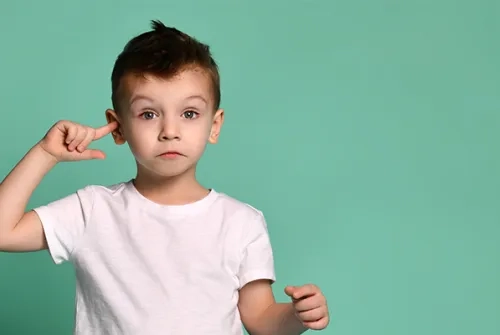Alo Yeditepe
Alo Yeditepe
Warning from the specialist: "Beware if your child turns up the volume of the TV too loud!"
According to recent studies conducted by TURKSTAT, hearing loss was detected in 2 percent of children between the ages of 2-14 in Turkey. Ear, Nose, and Throat Specialist Assoc. Prof. Dr. Mehmet İlhan Şahin, who said that hearing loss in childhood is more important than the hearing loss in adults, warned that children who turn up the volume of the television too much or who are too close to the television may have hearing loss.
Yeditepe University Hospitals Ear, Nose, and Throat Diseases Specialist Assoc. Prof. Dr. Mehmet İlhan Şahin said that children may not realize that they have hearing loss like adults, so childhood hearing loss is often overlooked. "We often see hearing loss due to fluid accumulation in the middle ear, especially in childhood. Up to four years of age, 90% of children have a buildup of fluid in the ear and inflammation at least once. This also leads to hearing loss. While most of them are temporary, 25 percent of them are serious."
"The Child Doesn't Express a Complaint Such as "My Hearing is Low"
Pointing out that families may not notice the presence of hearing loss, Assoc. Prof. Dr. Mehmet İlhan Şahin said, "Since the child will not indicate a complaint that I hear little, families should be alert to the behavior of the children."
"It is quite possible that hearing loss can be overlooked when there is no ear pain, fever, or another complaint in the child," said Assoc. Prof. Dr. İlhan Şahin explained the following about behaviors that may be stimulating in children: "One of the most important symptoms is that language development is slow. Symptoms such as the child's inability to learn words as quickly as expected after the age of 1 and not starting to form sentences when they are 2 years old should encourage families to research. In addition, children's inability to perceive whispered speech in noisy environments or home environments, misunderstanding words, and difficulty in distinguishing speech should warn us about hearing loss. In school-age children, symptoms such as social isolation, not communicating enough with friends, not chatting, low participation in class, and learning difficulties may also be signs of hearing loss."
Untreated Hearing Loss in the Early Stage Can Cause Permanent Damage!
Drawing attention to the fact that serious hearing loss may be permanent if not treated early, Assoc. Prof. Dr. Şahin also points out that serious conditions that may require surgery in the future may arise such as the collapse of the child's eardrum, cyst development, and chronic inflammation. Therefore, Assoc. Prof. Dr. Mehmet İlhan Şahin stated that they could prevent many serious damages with early treatment and gave the following information on the subject:
"The most important problem in young children is the appearance of permanent speech retardation. Apart from this, more serious medical problems may arise that cannot be compensated. When we catch and treat hearing loss in the early period, it is easier to catch up even if the child is behind their peers. We may not be able to close this difference in late diagnoses. In addition to the problems that may arise in language and mind development, situations that require surgery can also be encountered. In cases where treatment is not useful, children may have to use hearing aids."
What Should Families Do to Prevent Hearing Loss?
Assoc. Prof. Dr. Mehmet İlhan Şahin warned families about what needs to be done to prevent hearing loss at an early age:
"Conditions such as frequent respiratory tract infection, enlarged adenoids and tonsils, allergic catarrh, exposure to cigarette smoke, and low hygiene increase the risk of fluid accumulation in the ear. The use of baby bottles in younger children can also cause this. For this reason, families need to be careful about issues such as not feeding small children with a bottle by lying flat, never exposing them to cigarette smoke, and if there is an allergy, adenoids and tonsil enlargement, performing their treatment."
Yeditepe University Kozyatağı Hospital Ear, Nose, and Throat Specialist Assoc. Prof. Dr. İlhan Şahin underlined that it should be known that hearing loss is especially common until the age of 7-8, and concluded: "If the child cannot hear whispered conversations, turns up their voice too loud while watching television or gets too close to the television, does not fully understand or misunderstands what happens when you say something, parents should not forget that their child may have hearing loss in such cases. Although we do not recommend routine examination for every child, ear, nose, and throat examination and hearing evaluation should be performed for the slightest suspicion."
This content was prepared by Yeditepe University Hospitals Medical Editorial Board.
Alo Yeditepe


